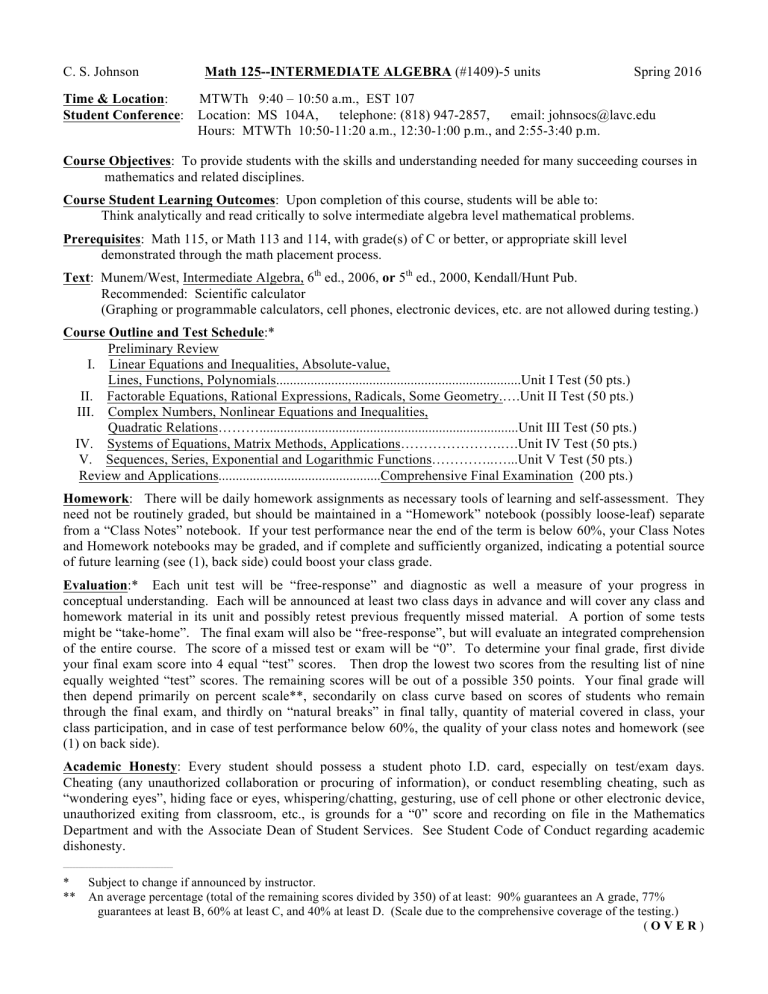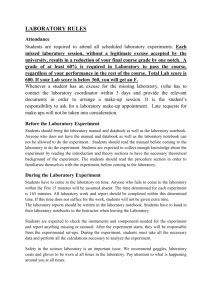CS Johnson Math 125--INTERMEDIATE ALGEBRA (#1409)

C. S. Johnson Math 125--INTERMEDIATE ALGEBRA (#1409)-5 units Spring 2016
Time & Location : MTWTh 9:40 – 10:50 a.m., EST 107
Student Conference : Location: MS 104A, telephone: (818) 947-2857, email: johnsocs@lavc.edu
Hours: MTWTh 10:50-11:20 a.m., 12:30-1:00 p.m., and 2:55-3:40 p.m.
Course Objectives : To provide students with the skills and understanding needed for many succeeding courses in
mathematics and related disciplines.
Course Student Learning Outcomes : Upon completion of this course, students will be able to:
Think analytically and read critically to solve intermediate algebra level mathematical problems.
Prerequisites : Math 115, or Math 113 and 114, with grade(s) of C or better, or appropriate skill level
demonstrated through the math placement process.
Text : Munem/West, Intermediate Algebra, 6 th ed., 2006, or 5 th ed., 2000, Kendall/Hunt Pub.
Recommended: Scientific calculator
(Graphing or programmable calculators, cell phones, electronic devices, etc. are not allowed during testing.)
Course Outline and Test Schedule :*
Preliminary Review
I. Linear Equations and Inequalities, Absolute-value,
Lines, Functions, Polynomials.......................................................................Unit I Test (50 pts.)
II. Factorable Equations, Rational Expressions, Radicals, Some Geometry.….Unit II Test (50 pts.)
III. Complex Numbers, Nonlinear Equations and Inequalities,
Quadratic Relations………...........................................................................Unit III Test (50 pts.)
IV. Systems of Equations, Matrix Methods, Applications………………….….Unit IV Test (50 pts.)
V. Sequences, Series, Exponential and Logarithmic Functions…………..…...Unit V Test (50 pts.)
Review and Applications...............................................Comprehensive Final Examination (200 pts.)
Homework : There will be daily homework assignments as necessary tools of learning and self-assessment. They need not be routinely graded, but should be maintained in a “Homework” notebook (possibly loose-leaf) separate from a “Class Notes” notebook. If your test performance near the end of the term is below 60%, your Class Notes and Homework notebooks may be graded, and if complete and sufficiently organized, indicating a potential source of future learning (see (1), back side) could boost your class grade.
Evaluation :* Each unit test will be “free-response” and diagnostic as well a measure of your progress in conceptual understanding. Each will be announced at least two class days in advance and will cover any class and homework material in its unit and possibly retest previous frequently missed material. A portion of some tests might be “take-home”. The final exam will also be “free-response”, but will evaluate an integrated comprehension of the entire course. The score of a missed test or exam will be “0”. To determine your final grade, first divide your final exam score into 4 equal “test” scores. Then drop the lowest two scores from the resulting list of nine equally weighted “test” scores. The remaining scores will be out of a possible 350 points. Your final grade will then depend primarily on percent scale**, secondarily on class curve based on scores of students who remain through the final exam, and thirdly on “natural breaks” in final tally, quantity of material covered in class, your class participation, and in case of test performance below 60%, the quality of your class notes and homework (see
(1) on back side).
Academic Honesty : Every student should possess a student photo I.D. card, especially on test/exam days.
Cheating (any unauthorized collaboration or procuring of information), or conduct resembling cheating, such as
“wondering eyes”, hiding face or eyes, whispering/chatting, gesturing, use of cell phone or other electronic device, unauthorized exiting from classroom, etc., is grounds for a “0” score and recording on file in the Mathematics
Department and with the Associate Dean of Student Services. See Student Code of Conduct regarding academic dishonesty.
___________________________________
* Subject to change if announced by instructor.
** An average percentage (total of the remaining scores divided by 350) of at least: 90% guarantees an A grade, 77%
guarantees at least B, 60% at least C, and 40% at least D. (Scale due to the comprehensive coverage of the testing.)
( O V E R )
(Continued from other side )
Accommodations: If you have a disability and qualify for classroom accommodation through the SSD office
(Student Services Annex, telephone (818) 947-2681 or 2680), please see me to discuss arrangements.
Adding or Auditing the Class : Last day to add or audit is Friday, February 19, 2016.
Attendance: Any absence on the first day, or on both the second and third days, or a total of five unexcused absences warrants (but does not assure) exclusion from roster. Three tardies (late entrance or early exit) count as one absence.
Withdrawal from Class : Voluntary withdrawal must be made through Admissions via internet by
Sunday, February 21, 2016 without incurring fees, with refund of enrollment fees, and without a “W”
Sunday, May 8, 2016 with a “W”.
FAILURE TO WITHDRAW ON TIME MAY RESULT IN A GRADE OF “F” IN THE CLASS.
Academic Calendar: Your Final Exam will be during Week 16 at a time to be announced. For the calendar of
holidays and non-instruction days, see LAVC website or announcement in class.
Financial Aid: Available at Financial Aid Office in the Student Services Center, telephone (818) 947-2412,
http://www.lavc.edu/financialaid/index.html.
Daily Routine and Classroom Decorum : Most class sessions other than test days will begin with answering
questions on homework or lecture/discussion as needed and as time permits. The bulk of the session will then
be devoted to covering new material. Any student engaging in classroom behavior which is disruptive or
distracting (e.g., side conversation, use of cell phone, audio or other electronic device, etc.) is subject to being
barred from the class for up to two sessions and subject to administrative disciplinary action.
Recommendations for Maximum Success : Learning mathematics involves active engagement. The following
guidelines will likely prove helpful:
(1) Maintain two notebooks :*** One for “Class Notes” and the second for “Homework”, possibly loose-leaf. In the first notebook, take legible and complete notes, organized by topic, on lecture/discussion. The basic content of the course will then be found all in one place. Using this notebook just for class note taking avoids the discontinuity due to homework efforts, and facilitates review and preparation for testing. Take complete notes even when you believe that lecture/discussion moves too fast for “instant understanding”. Real learning comes only upon reviewing the material and applying the concepts. On a nightly basis reviewing at least the present day’s class notes before beginning homework assignments should help you “tune into” the concepts needed for the assignments. Maintaining legible, complete and organized homework efforts in the
“Homework” notebook can help you track your progress in conceptual understanding. Homework efforts may contain “scratch outs”, as they represent efforts needing re-examination. One gage of your progress is the extent to which you can work the “harder” exercises independent of text and notes. Your class notes and homework notebooks may be graded near the end of the term in case of test performance below 60%.
(2) To facilitate classroom discussion of homework and to be first to be heard with your questions : Before class begins, pose your question or problem on the board together with your attempted solution. Start at the left of the board and allow space for the solution. Up to four or five students can pose problems on the board this way. This process may bring you answers from classmates before I come in. It can also help me (or classmates) zoom into your difficulty by “spotting” your error.
(3) The “vertical” nature of mathematics (interdependency of topics) necessitates that you avoid gaps in understanding. So try to get acquainted with at least two classmates who can update you in case you miss a class session. Such classmates might also become good study mates.
(4) On average, success in college mathematics entails spending at least twice as much time outside of class on homework and review as scheduled in-class time. Consider this in planning your schedule in light of other commitments (employment, family, etc.).
_________________
*** Recommendation (1) becomes a necessary means for possible grade boost in case of test performance below 60%.

